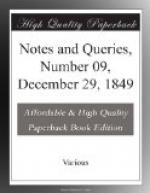In 1780 Colonel Watson was recalled to India, and took out with him one of the most remarkable English mathematicians of that day, Reuben Burrow. This gentleman had been assistant to Dr. Maskelyne at the Royal Observatory; and to his care was, in fact, committed the celebrated Schehallien experiments and observations. He died in India, and, I believe, all his papers which reached England, as well as several of his letters, are in my possession. This, however, is no further of consequence in the present matter, than to give authority to a remark I am about to quote from one of his letters to his most intimate friend, Isaac Dalby. In this he says:—“Colonel Watson has out here a work of Simpson’s on bridges, very complete and original.”
It was no doubt by his dread of the sleepless watch of Hutton, that so unscrupulous a person as Colonel Watson is proved to be, was deterred from publishing Simpson’s work as his own.
The desideratum here is, of course, to find what became of Colonel Watson’s papers; and then to ascertain whether this and what other writings of Simpson’s are amongst them. A really good work on the mathematical theory of bridges, if such is ever to exist, has yet to be published. It is, at the same time, very likely that his great originality, and his wonderful sagacity in all his investigations, would not fail him in this; and possibly a better work on the subject was composed ninety years ago than has yet seen the light—involving, perhaps, the germs of a totally new and more effective method of investigation.
I have, I fear, already trespassed too far upon your space for a single letter; and will, therefore, defer my notice of a few other desiderata till a future day.
T.S.D.
Shooter’s Hill, Dec. 15. 1849.
* * * * *
SONG IN THE STYLE OF SUCKLING—THE TWO NOBLE KINSMEN.
The song in your second number, furnished by a correspondent, and considered to be in the style {134} of Suckling, is of a class common enough in the time of Charles I. George Wither, rather than Suckling, I consider as the head of a race of poets peculiar to that age, as “Shall I wasting in Despair” may be regarded as the type of this class of poems. The present instance I do not think of very high merit, and certainly not good enough for Suckling. Such as it is, however, with a few unimportant variations, it may be found at page 101. of the 1st vol. of The Hive, a Collection of the most celebrated Songs. My copy is the 2nd edit. London, 1724.
I will, with your permission, take this opportunity of setting Mr. Dyce right with regard to a passage in the Two Noble Kinsmen, in which he is only less wrong than all his predecessors. It is to be found in the second scene of the fourth act, and is as follows:—




